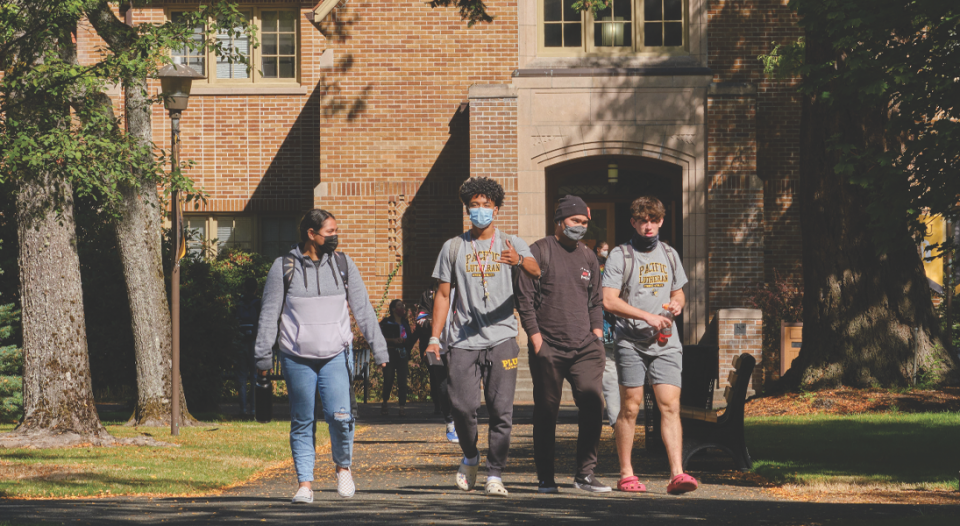Committed to the accessibility and affordability of higher education, Pacific Lutheran University (PLU) in Tacoma, Wash., has sworn off annual tuition hikes in favor of a fixed tuition that covers a student’s entire course of study.
PLU’s fixed-tuition guarantee, which the school believes to be the first among the ELCA’s 26 colleges and universities, will start with students enrolling in fall 2022.
“Increased costs of less than $1,500 on average can make a difference for a student,” said Allan Belton, president of PLU. “It’s nice to see us coming to terms with doing what we have to do to provide access to an education.”
Belton noted that, on average, students at private universities in the Puget Sound region, where PLU is located, pay about $5,400 more in tuition for their senior year than for their freshman year. As tuition inches up 3-4% each year, a student’s annual scholarship funds and financial aid generally remain the same or may decrease. “This can push families into financial hardship or force students to leave their university with debt but without a degree,” he said. “We need to stop that cycle.”
“Now when someone asks me, ‘What is tuition going to look like next year?,’ I can tell them, ‘Exactly what it looks like this year.’”
This fall, PLU’s first-year tuition of $49,472 will be guaranteed to all students for the length of their enrollment, though the guaranteed fixed rate may increase for the next incoming class.
“Now when someone asks me, ‘What is tuition going to look like next year?,’ I can tell them, ‘Exactly what it looks like this year,’” said Melody Ferguson, associate dean of admission. “It’s really nice to be able to say that.”
Founded in 1890 by Norwegian immigrants, PLU operates under the core elements of Lutheran higher education, which include “protection of learning” and “service to the advancement of life, health and wholeness.” The average out-of-pocket cost to attend PLU for one year, including room, board and fees, is about $19,000. Nearly all the school’s 2,900 students receive one or more forms of financial aid.
As part of its Lutheran identity, the university believes in removing financial burdens for current and prospective students, providing access to an education that some students may not otherwise receive, and eliminating barriers to graduation.
“About two years ago, our board of regents and our president asked a few of us to rethink the traditional model of constant increases in tuition,” Ferguson said. “Our president came up with this idea of fixed tuition, and we didn’t find a lot of reasons not to do it.”
Providing stability
The university thinks it can make up or even exceed the revenue from tuition increases by enrolling and graduating more students.
“The retention piece, we can’t know if that works in one year—we need a group to come in and follow them through,” Ferguson said. “Hopefully it does work and provides more stability to families, and to us, in some ways, too. We’ll know what to expect in terms of tuition each year.”
The fixed-tuition guarantee is part of a series of actions PLU has taken to mitigate the financial burdens of students, particularly those from middle- or low-income households. Another key initiative is the PLU Pledge, a student loan repayment-assistance program for graduates earning less than $50,000 per year.
The data show that PLU’s efforts to make college more accessible, including for students from traditionally underserved populations, are working. More than 40% of its first-year students are the first in their family to attend college, and in fall 2021, for the first time, the majority of new students are people of color―a significant statistic given that two-thirds of Washington’s population is white and two-thirds of PLU’s students are state residents.
The data show that PLU’s efforts to make college more accessible, including for students from traditionally underserved populations, are working.
Belton is particularly pleased that some students enrolled through a novel direct-admission pilot program launched last summer. The university teamed with Tacoma-area high schools to identify students who appeared likely to succeed in higher education but hadn’t completed their application process anywhere.
“Melody and I and a few others thought about what we could do to break down barriers,” Belton said. “We reached out to about 300 kids and said, ‘If you want to come to PLU, you’re in.’ There are a dozen students right now at PLU who hadn’t even applied to college.
“It’s not about getting kids to PLU, it’s about getting kids to an education. We welcome copycats, and anyone who wants to copy us should feel free to reach out to our team for help.”
Pacific Lutheran University is one of 26 ELCA colleges and universities. For more information, visit plu.edu or elca.org/colleges.





